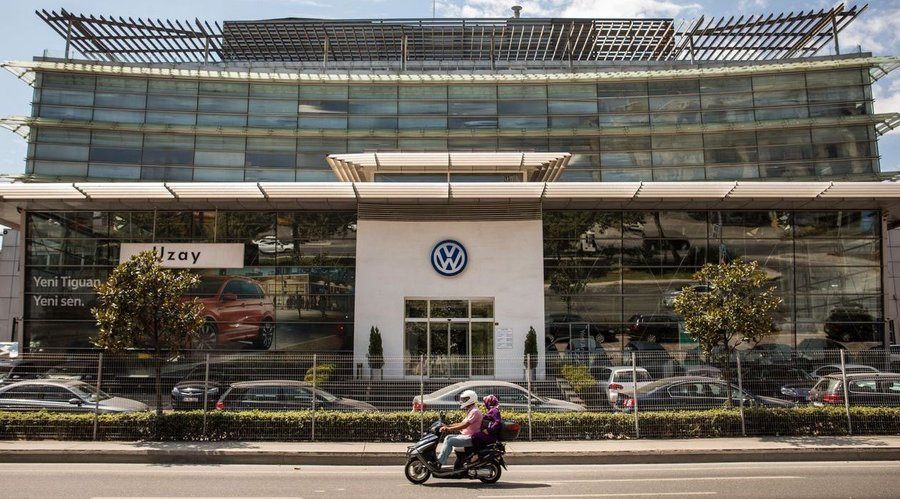Volkswagen Delays Approval for Turkey Plant Following Syria Incursion

Volkswagen AG delayed approval of a new car plant in Turkey, as investors and multinationals weighed the country’s ability to weather economic pressure from the West after its military incursion into northern Syria.
Early investor reaction to an initial package of economic restrictions was muted, however, with some market watchers saying they had expected a tougher line from Washington. The Turkish lira rose modestly against the dollar on Tuesday.
“It’s a classic relief rally,” said Piotr Matys, an emerging-markets strategist at Rabobank. “There were serious concerns that the sanctions could be quite harsh, but President Trump opted for relatively soft measures.”
Turkey is also more prepared to withstand economic headwinds than it was as recently as last year, when a currency crisis there sent ripples across emerging markets. The lira shed nearly a third of its value against the dollar last year, the economy tipped into recession and inflation topped 25%.
Growth has since picked up and inflation has tempered, even as the central bank delivered a series of large cuts to the benchmark lending rates. The country has also imposed mechanisms to insulate the economy somewhat from sudden economic shocks.
Since May, companies willing to buy more than $100,000 at a time must wait 24 hours before their transactions are processed, giving Turkish officials time to anticipate and counter big selling that would normally drive down the lira, people familiar with the matter said.
Investors and executives said ramifications for markets and businesses could intensify if the U.S., in particular, were to step up pressure.
“One concern is if there are harsher sanctions coming, that they seek to lock Turkey out of international capital markets. That would be a large risk for the financial sector given their large external debt,” said Jason Tuvey, senior emerging markets economist at Capital Economics.
On Monday, the U.S. authorized financial sanctions against Turkey’s defense, interior and energy ministries and their agencies. It also raised steel tariffs to 50%, after lowering them from that level in May. The restrictions were taken in retaliation for Turkey’s decision to launch a military offensive in northern Syria, after the Trump administration started withdrawing U.S. troops from the region.
The U.S. Treasury said it would issue waivers to ensure sanctions didn’t disrupt the entire country’s energy needs, and will allow officials and contractors conducting business for the U.S. government to work with the blacklisted officials and offices.
Volkswagen’s move underscored the longer-term stakes for the country’s economy and for multinationals heavily invested in Turkey, after years of economic integration with the rest of the world. The planned Volkswagen factory is an example of how closely Turkey has become woven into the fabric of global manufacturing networks.
Take autos. Western car makers opened their first joint ventures in Turkey in the 1960s, with France’s Renault SA, Ford Motor Co. and Italy’s Fiat, now part of Fiat Chrysler Automobiles NV, leading the way. Today, there are more than 400 major automotive suppliers there, many feeding auto factories in Europe. They include big names like Bosch GmbH, Continental AG and Magna International Inc. Their Turkish factories are key suppliers of components for Volkswagen and Daimler AG .
Initially, auto makers produced vehicles for the Turkish market, but today exports dominate. Last year, around 1.6 million vehicles were produced in Turkey, such as Ford’s top-selling Transit commercial vehicle. Around 81% of the vehicles produced in Turkey last year were exported, mostly to Europe.
The German auto giant had chosen Turkey over Bulgaria for the new assembly plant, which was set to make Skoda and Seat models to free up capacity at its European plants to make electric cars. Volkswagen had registered a Turkish subsidiary last week to start the process.
Volkswagen’s management board was expected to give final approval in coming days to invest €1 billion ($1.1 billion) to build a plant with an annual capacity of 300,000 cars. Planned for Manisa, near Izmir in the Anatolia province, the plant was expected to provide 4,000 jobs with the start of production in 2022.
The delay comes amid intense political pressure in Europe—particularly from Berlin—to protest the incursion. Germany, France, Finland and Sweden were among the first countries to enact an embargo on arms exports to Turkey in the wake of the attack.
“The pictures that we are seeing from northern Syria are appalling,” said Stephan Weil, who sits on Volkswagen’s supervisory board as prime minister of Germany’s Lower Saxony state, which has a 20% stake in the auto maker. “I can’t imagine that under these circumstances Volkswagen can make a billion-euro investment in Turkey.”
Volkswagen said it was monitoring “the current situation closely and [is] concerned about current developments.”
